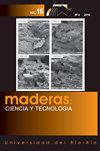木材工业中香柏木、总状梭梭和大构造木热降解动力学分析
IF 1.5
4区 农林科学
Q3 MATERIALS SCIENCE, PAPER & WOOD
引用次数: 1
摘要
热分析是预测不同材料组成和热稳定性的有力工具。在非等温条件下,以4种不同的升温速率(5°C·min-1、10°C·min-1、20°C·min-1和40°C·min-1)对香松、总状Marmaroxylon和大构造进行了热重分析。采用Flynn-Wall-Ozawa法和Criado法对其降解动力学进行了评价。研究了木材降解反应的半衰期。木材在氧化气氛中的热降解过程可分为脱水、脱挥发和燃烧。动力学结果表明,当转化值为0,1 ~ 0,5时,大地构造的表观活化能为130 ~ 240 kJ·mol-1,总状棉的表观活化能为150 ~ 191 kJ·mol-1,香松的表观活化能为188 ~ 205 kJ·mol-1。最可能的降解机制是基于三维扩散的扩散模型。反应半衰期最短的是香柏木,反应半衰期最长的是总状棉。基于这些结果,可以得出结论,Flynn-Wall-Ozawa和Criado方法与反应半衰期有关,有助于更好地了解木材在用于聚合物复合材料之前的降解过程。本文章由计算机程序翻译,如有差异,请以英文原文为准。
Kinetic analysis of thermal degradation of Cedrela odorata, Marmaroxylon racemosum and Tectona grandis from timber industry
Thermal analysis is a powerful tool to predict the composition and thermal stability of different materials. In this work, thermogravimetric analysis of Cedrela odorata, Marmaroxylon racemosum and Tectona grandis was carried out at four different heating rates (5 °C·min-1, 10 °C·min-1, 20 °C·min-1 and 40 °C·min-1) in a non-isothermal condition. The degradation kinetics was evaluated based on Flynn-Wall-Ozawa and Criado methods. The half-life time of wood degradation reaction was also studied. The wood thermal degradation process in an oxidizing atmosphere can be divided in dehydration, devolatilization, and combustion. The kinetic results revels apparent activation energy values of 130-240 kJ·mol-1 for Tectona grandis, 150-191 kJ·mol-1 for Marmaroxylon racemosum and 188-205 kJ·mol-1 for Cedrela odorata, when conversion values ranged from 0,1-0,5. The most probable degradation mechanism for wood species studied is a diffusion model based on a three-dimensional diffusion. Cedrela odorata presented the lowest reaction half-life time while Marmaroxylon racemosum showed the highest. On the basis of these results, it can be concluded that Flynn-Wall-Ozawa and Criado methods associated with half-life time of reaction may contribute to better understand the wood degradation before use it in polymer composites.
求助全文
通过发布文献求助,成功后即可免费获取论文全文。
去求助
来源期刊

Maderas-ciencia Y Tecnologia
工程技术-材料科学:纸与木材
CiteScore
2.60
自引率
13.30%
发文量
33
审稿时长
>12 weeks
期刊介绍:
Maderas-Cienc Tecnol publishes inedits and original research articles in Spanish and English. The contributions for their publication should be unpublished and the journal is reserved all the rights of reproduction of the content of the same ones. All the articles are subjected to evaluation to the Publishing Committee or external consultants. At least two reviewers under double blind system. Previous acceptance of the Publishing Committee, summaries of thesis of Magíster and Doctorate are also published, technical opinions, revision of books and reports of congresses, related with the Science and the Technology of the Wood. The journal have not articles processing and submission charges.
 求助内容:
求助内容: 应助结果提醒方式:
应助结果提醒方式:


